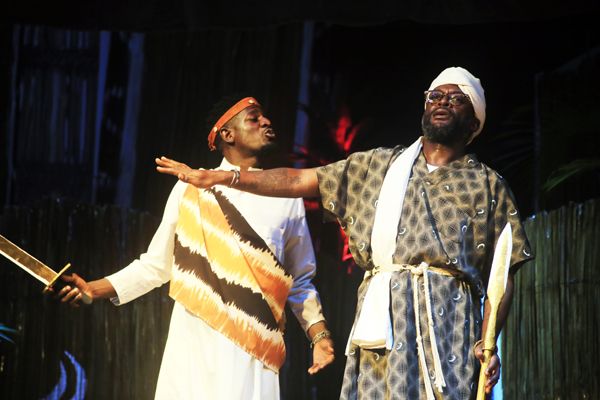
Golden Calabash is a political satire wrapped in a Kingdom of Bahehe. Photo | Andrew Kaggwa
The theatre has spent 2023 trying to find solutions to its predicament; questions have been asked and in the same way, panel discussions have been held.
On his part, John Ssegawa believes theatre can only return to its former glory when it embraces the existing challenges but, in the same way, adapts and redefines the art.
His past two offerings, Zansanze, which was staged in 2019, and his latest, Golden Calabash, have been a testament to his willingness to learn, unlearn, and, at the same time, teach.
Golden Calabash, which made its premiere at the National Theatre over the Christmas holiday, is not exactly a new production off the page; rather, it is a redefinition of a classic that Afri-Talent and Bakayimbira Dramaactors previously presented as Ekimala Ebita Embuga.
Abby Mukiibi, Andrew Benon Kibuuka, and John Ssegawa then played the titular roles. However, when the play was restaged at the National Theatre, he says the aim was to interest a new group of actors in theatre; besides, the rest of the cast was relatively new and young.
From the time the curtains open, a range of love stories that involve almost the entire cast are clear, but all unite in one passion: a secret desire to overthrow their leader.
Golden Calabash is a coming-of-age political satire wrapped in a Kingdom of Bahehe, where a king will get a vote of no confidence the moment it is noticed that he is no longer as strong as he should be. In that case, the son or daughter has to replace him.
The stage is lit a day after the king’s wedding. There are rumours that the king failed to lift the golden calabash, one of the norms that proves he is still capable, but there are also rumours that the old or outgoing queen, too, refused to leave the palace for the new queen.
This sets the production in motion, and as we go on, the kingdom is divided more along those who believe traditions and norms can be amended to accommodate an ageing king, while there are those who want to uphold the values.
The play is a collage of themes that are not new to many: deceit, social climbing, and tested trust. The show shines brightest on choreography and costume, which was a mix of different Ugandan traditions and others from African-renowned such as Zulu and Kinyarwanda. It is safe to believe the choice was to disguise the geography of the kingdom.